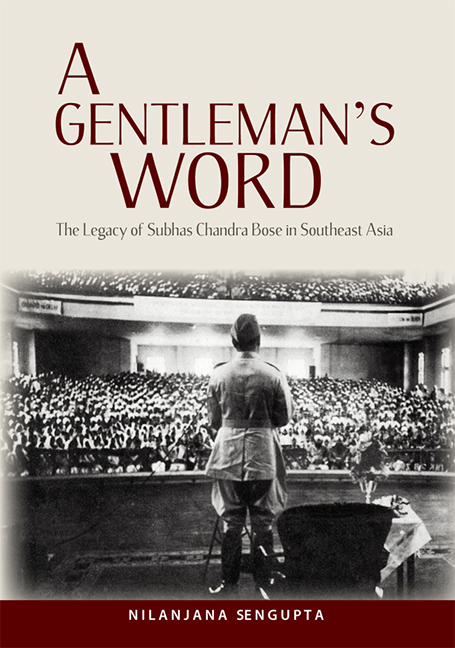Book contents
- Frontmatter
- Dedication
- Contents
- Foreword by S. R. Nathan
- Message by K. Kesavapany
- Message by Joyce C. Lebra
- Preface
- Acknowledgements
- 1 A Journey: A Dream
- 2 An Outsider in the Crescent and a Trial for Treason
- 3 End of a War, Beginning of Others
- 4 We are the Multitudes
- 5 “They Have Done Enough at Home”: Escape from the Shadows
- Bibliography
- Index
- About the Author
- Plate Section
5 - “They Have Done Enough at Home”: Escape from the Shadows
Published online by Cambridge University Press: 21 October 2015
- Frontmatter
- Dedication
- Contents
- Foreword by S. R. Nathan
- Message by K. Kesavapany
- Message by Joyce C. Lebra
- Preface
- Acknowledgements
- 1 A Journey: A Dream
- 2 An Outsider in the Crescent and a Trial for Treason
- 3 End of a War, Beginning of Others
- 4 We are the Multitudes
- 5 “They Have Done Enough at Home”: Escape from the Shadows
- Bibliography
- Index
- About the Author
- Plate Section
Summary
“With a houseful of hungry men to feed
I guess you'd find … It seems to me
I can't express my feelings anymore
Than I can raise my voice or want to lift
My hand … It's got so I don't even know for sure
Whether I am glad, sorry or anything.
There's nothing but a voice-like left inside
That seems to tell me how I ought to feel … the place is the asylum.”
— A Servant to Servants, Robert FrostTHE BACKGROUND
Muthammal Palanisamy's story unfolds across three generations on a rubber estate at Malaya. The plantation, called Sungai Wangi, is in a lesser-known district of Perak, peopled by men and women who are lost in history today. Muthammal's biography is peppered with female protagonists — daughters, wives, mothers who had willingly or unwillingly migrated from India in the wake of their menfolk, to find themselves in an unfamiliar and often hostile world. There is Saraswathy, born out of wedlock of a Scottish father and a Tamil mother. With her Caucasian good looks, it did not take long for Saraswathy to be noticed and one Mr Grant, a manager of a neighbouring estate, chose her for his wife. Much to her mother's delight, Saraswathy was whisked off to the manager's bungalow on an open cart drawn by the estate hands. She lived the life of a queen, except those few times when the British agents paid their customary visits — then she would be hastily hidden in the labour lines since a white manager was not allowed a “native” wife. Soon, war loomed large on the horizon and Mr Grant decided to leave Malaya. Saraswathi, with the children born to her in the meantime, was left behind on the estate. But Saraswathy and Mr Grant's tale did not end here — it was discovered a generation later, that the following year Mr Grant had returned to Malaya, this time with his Scottish wife and, unknown to Saraswathy, had settled to a new life of peaceful domesticity.
Again, there is Palaniammal, Muthammal's mother. She grew up on a farm in a remote village of India and was rushed into an unhappy marriage at the age of ten to protect the honour of the Gounder clan to which she belonged.
- Type
- Chapter
- Information
- A Gentleman's WordThe Legacy of Subhas Chandra Bose in Southeast Asia, pp. 195 - 236Publisher: ISEAS–Yusof Ishak InstitutePrint publication year: 2012

